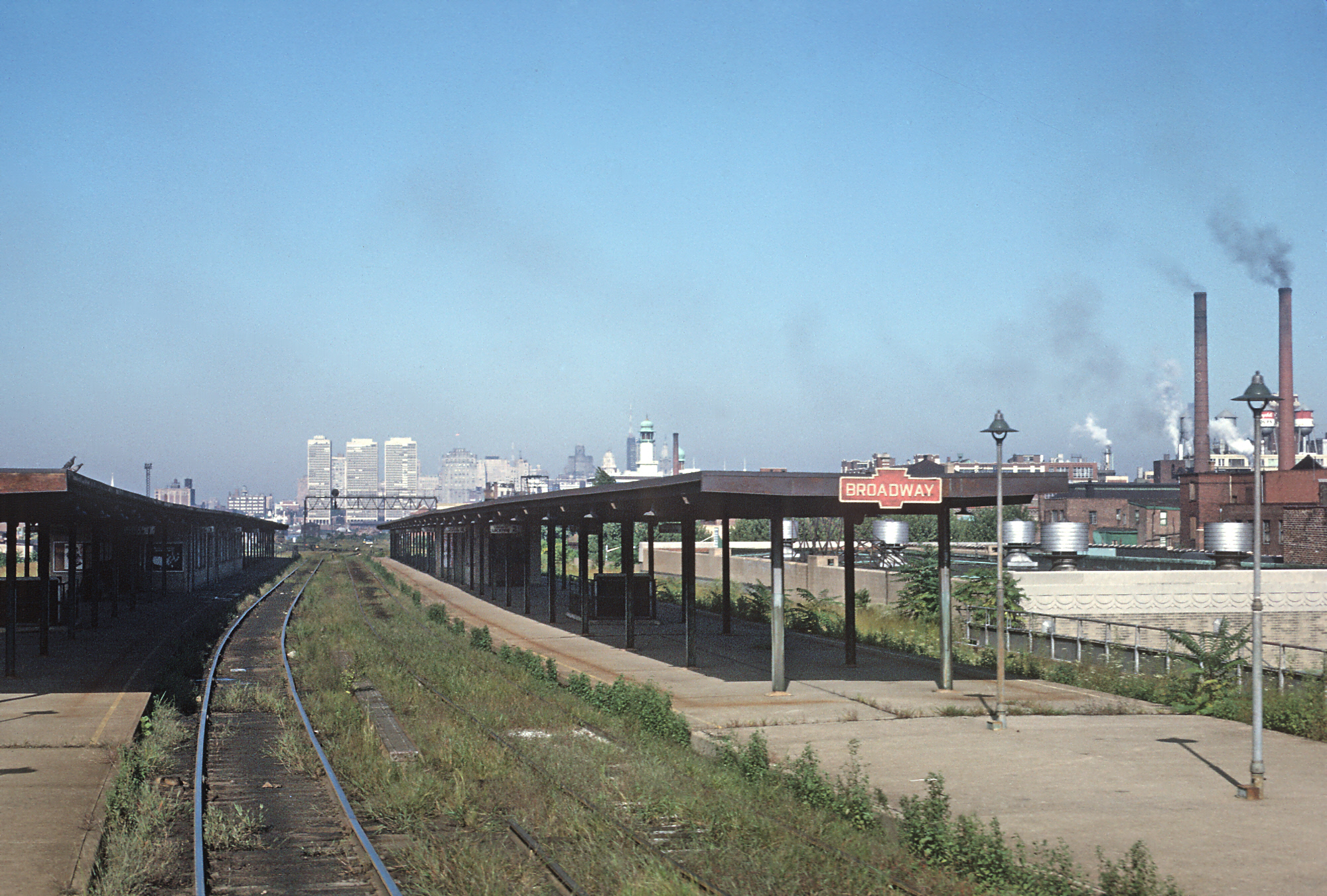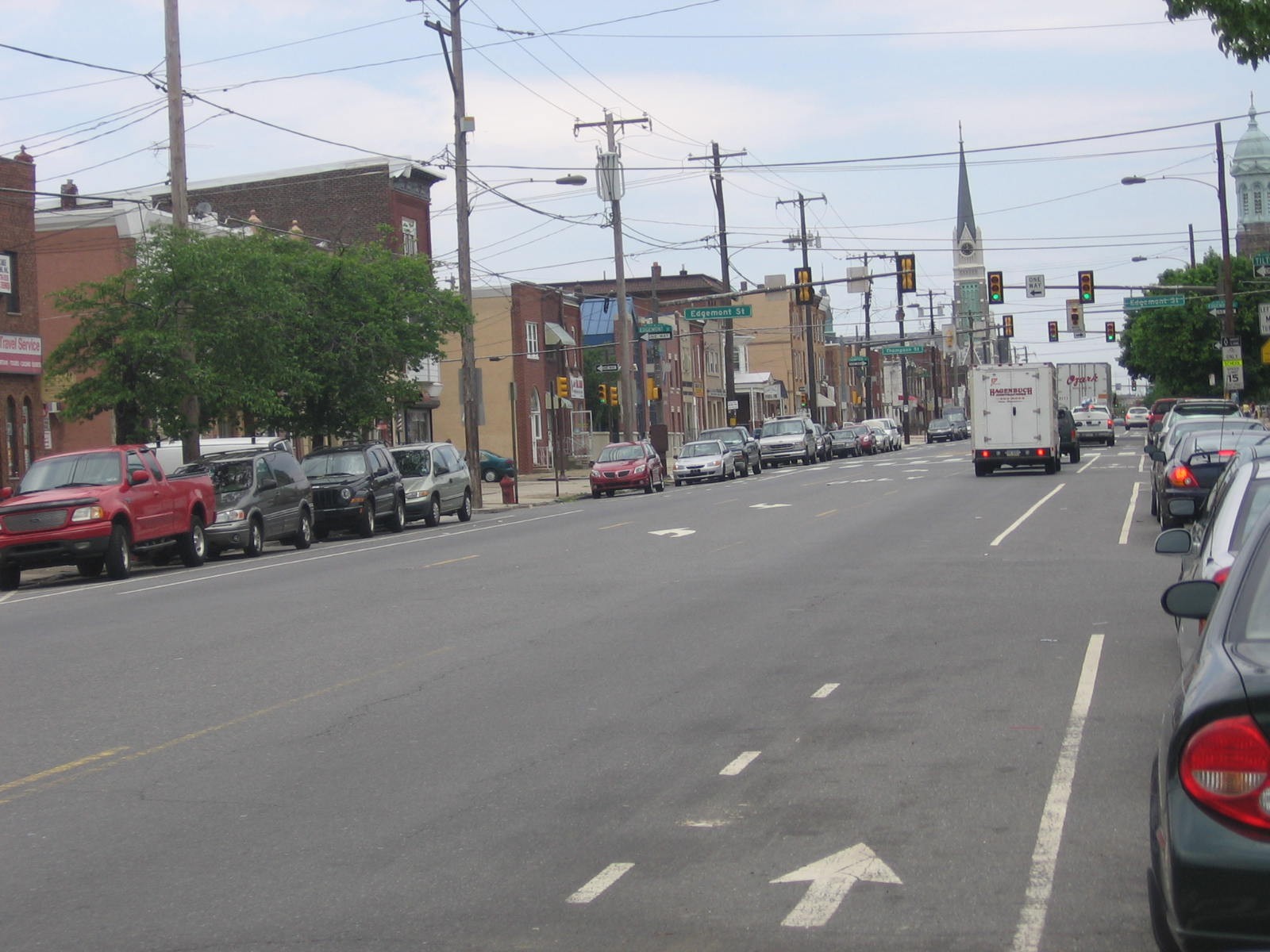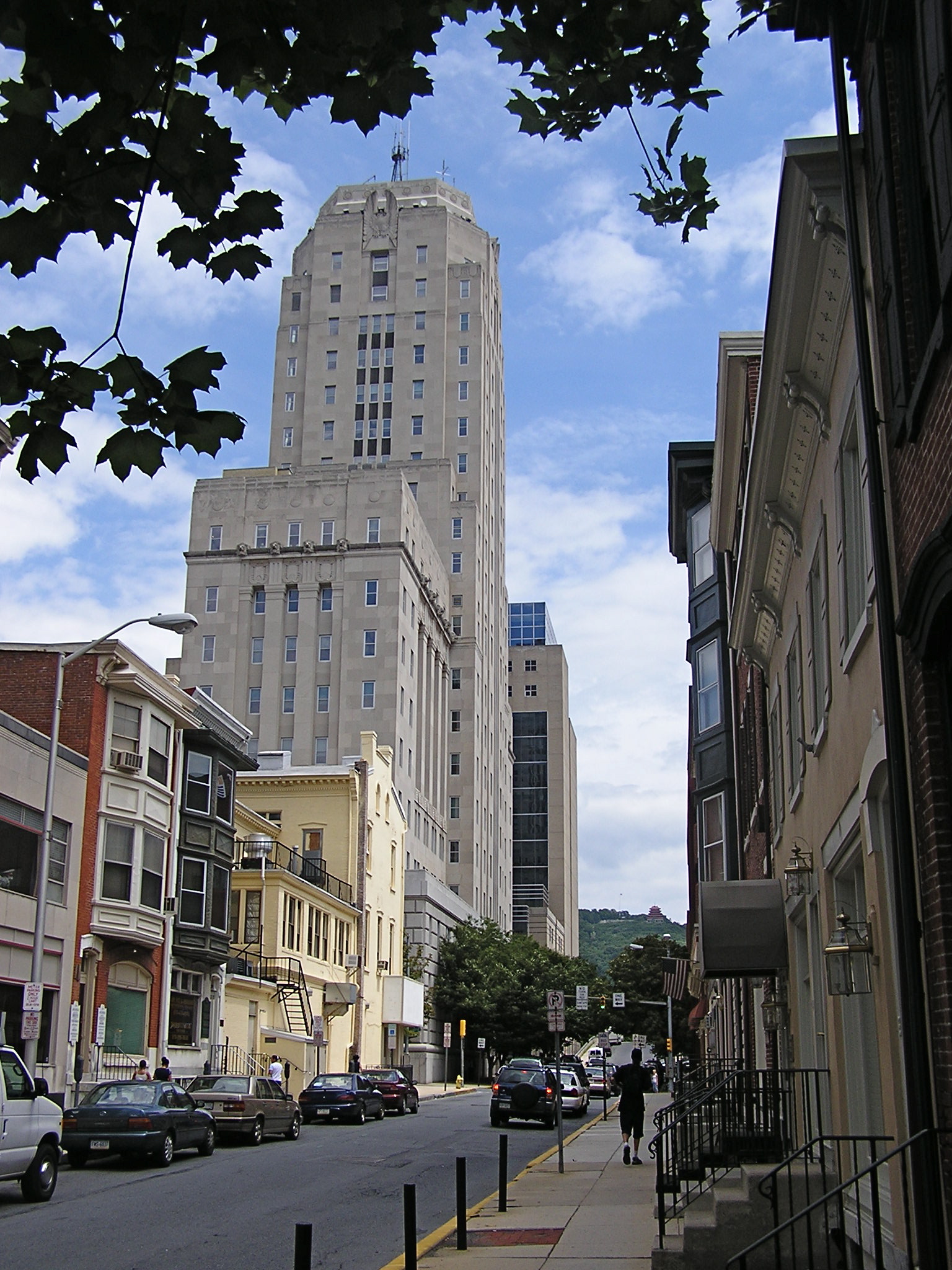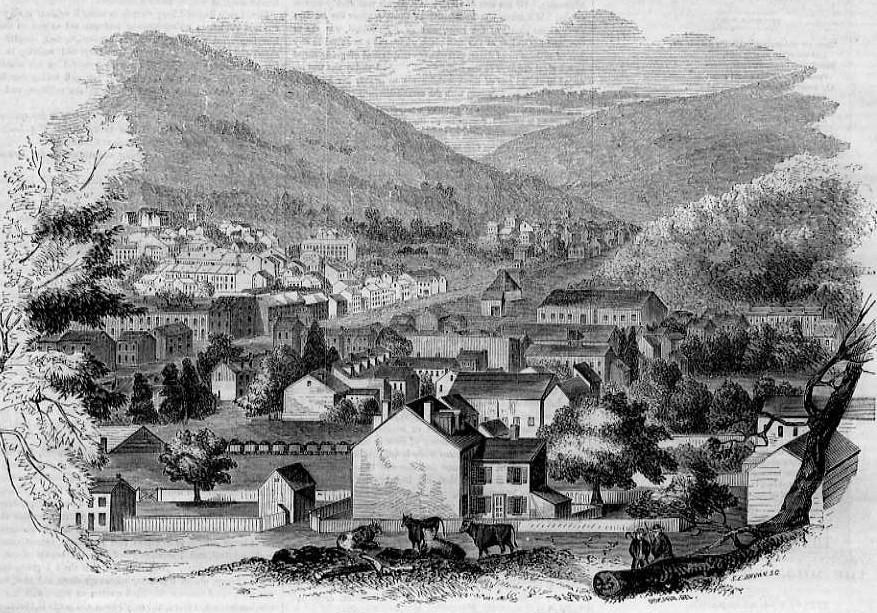|
Reading Company
The Reading Company ( ) was a Philadelphia-headquartered railroad that provided passenger and commercial rail transport in eastern Pennsylvania and neighboring states that operated from 1924 until its 1976 acquisition by Conrail. Commonly called the Reading Railroad, and logotyped as Reading Lines, the Reading Company was a railroad holding company for the majority of its existence and was a single railroad during its later years. It operated service as Reading Railway System and was a successor to the Philadelphia and Reading Railway Company, founded in 1833. Until the decline in anthracite loadings in the Coal Region after World War II, it was one of the most prosperous corporations in the United States. Competition with the modern trucking industry that used the interstate highway system for short-distance transportation of goods, also known as short hauls, compounded the company's problems, forcing it into bankruptcy in 1971. Its railroad operations were merged into Conrail i ... [...More Info...] [...Related Items...] OR: [Wikipedia] [Google] [Baidu] |
Pennsylvania-Reading Seashore Lines
The Pennsylvania-Reading Seashore Lines was a railroad that operated in South Jersey in the 20th century. It was created in 1933 as a joint consolidation venture between two competing railroads in the region: the Pennsylvania Railroad and the Reading Company. History In the early 20th century, Atlantic City, New Jersey, Atlantic City and the southern New Jersey coast, seashore were major seaside Holiday, vacation destinations for the Delaware Valley, Philadelphia area's wealthy and working class populations. The popularity of "South Jersey"'s seashore was made possible by rail transport which provided inexpensive and fast service between the Philadelphia area's population centers and shore points. There were two competing railroad companies connecting Camden, New Jersey, Camden and, by ferry, Philadelphia, with the South Jersey seashore. Competition was fierce and by its height in the 1920s competition between the West Jersey and Seashore Railroad (WJ&S), owned by the Penns ... [...More Info...] [...Related Items...] OR: [Wikipedia] [Google] [Baidu] |
World War II
World War II or the Second World War, often abbreviated as WWII or WW2, was a world war that lasted from 1939 to 1945. It involved the vast majority of the world's countries—including all of the great powers—forming two opposing military alliances: the Allies and the Axis powers. World War II was a total war that directly involved more than 100 million personnel from more than 30 countries. The major participants in the war threw their entire economic, industrial, and scientific capabilities behind the war effort, blurring the distinction between civilian and military resources. Aircraft played a major role in the conflict, enabling the strategic bombing of population centres and deploying the only two nuclear weapons ever used in war. World War II was by far the deadliest conflict in human history; it resulted in 70 to 85 million fatalities, mostly among civilians. Tens of millions died due to genocides (including the Holocaust), starvation, ma ... [...More Info...] [...Related Items...] OR: [Wikipedia] [Google] [Baidu] |
Vertical Integration
In microeconomics, management and international political economy, vertical integration is a term that describes the arrangement in which the supply chain of a company is integrated and owned by that company. Usually each member of the supply chain produces a different product or (market-specific) service, and the products combine to satisfy a common need. It contrasts with horizontal integration, wherein a company produces several items that are related to one another. Vertical integration has also described management styles that bring large portions of the supply chain not only under a common ownership but also into one corporation (as in the 1920s when the Ford River Rouge Complex began making much of its own steel rather than buying it from suppliers). Vertical integration and expansion is desired because it secures supplies needed by the firm to produce its product and the market needed to sell the product. Vertical integration and expansion can become undesirable whe ... [...More Info...] [...Related Items...] OR: [Wikipedia] [Google] [Baidu] |
Reading Anthracite Company
Reading Anthracite Company is a coal mining company based in Pottsville, Pennsylvania in the United States. It mainly mines anthracite coal in the Coal Region of eastern Pennsylvania. The company owns the Bear Valley Strip Mine in Northumberland County, Pennsylvania.Sequence of structural stages of the Alleghany orogeny at the Bear Valley Strip Mine, Shamokin, Pennsylvania. Nickelsen, R. P. (Dept. of Geology, Bucknell University) Geological Society of America The Geological Society of America (GSA) is a nonprofit organization dedicated to the advancement of the geosciences. History The society was founded in Ithaca, New York, in 1888 by Alexander Winchell, John J. Stevenson, Charles H. Hitchco ... Centennial Field Guide—Northeastern Section, 1987 History Reading Anthracite Company; origins date back to 1871 when its predecessor, the Philadelphia and Reading Coal and Iron Company (P. & R. C.& I.) was chartered. As a large publicly traded concern, P. & R. C. & I. had ... [...More Info...] [...Related Items...] OR: [Wikipedia] [Google] [Baidu] |
Port Richmond, Philadelphia, Pennsylvania
Port Richmond is a neighborhood in the River Wards section of Philadelphia, Pennsylvania. It is notable for its extremely large Polish immigrant and Polish American community. The neighborhood is also home to a large Irish American community and sizable German and Italian communities as represented in the various churches and organizations. In more recent years, a sizable Albanian community has moved in. The Richmond Zip Code is 19134 and 19125. The neighborhood is bounded by the Castor Avenue to the northeast, Somerset Street to the southwest, the Delaware River to the southeast, and Trenton Avenue/the railroad to the northwest. While there is some dispute about the western boundary of the neighborhood, some people stating either Aramingo Avenue or Frankford Avenue, general consensus among residents on either side of Trenton Avenue or the railroad is that those east of it claim Port Richmond and those west of it claim Kensington. While some have referred to Port Richmond as Richm ... [...More Info...] [...Related Items...] OR: [Wikipedia] [Google] [Baidu] |
Lehigh Coal & Navigation Company
The Lehigh Coal & Navigation Company was a mining and transportation company headquartered in Mauch Chunk, Pennsylvania, now known as Jim Thorpe, Pennsylvania. The company operated from 1818 until its dissolution in 1964 and played an early and influential role in the rise of the American Industrial Revolution and early U.S. industrialization. The company ultimately encompassed source industries, transport, and manufacturing, making it the first vertically integrated U.S. company.Archer B. HulbertThe Paths of Inland Commerce, A Chronicle of Trail, Road, and Waterway, Vol. 21, The Chronicles of America Series. Editor: Allen Johnson (1921) Building on two predecessor companies incorporated in 1818,, 627 pages (pdf) founders Erskine Hazard and Josiah White entered the coal industry to serve customers seeking a steady supply of fuel for foundries and mills on the falls of the Schuylkill River. Its role in accelerating regional industrial development by taking on civil engineering ch ... [...More Info...] [...Related Items...] OR: [Wikipedia] [Google] [Baidu] |
Double Track
A double-track railway usually involves running one track in each direction, compared to a single-track railway where trains in both directions share the same track. Overview In the earliest days of railways in the United Kingdom, most lines were built as double-track because of the difficulty of co-ordinating operations before the invention of the telegraph. The lines also tended to be busy enough to be beyond the capacity of a single track. In the early days the Board of Trade did not consider any single-track railway line to be complete. In the earliest days of railways in the United States most lines were built as single-track for reasons of cost, and very inefficient timetable working systems were used to prevent head-on collisions on single lines. This improved with the development of the telegraph and the train order system. Operation Handedness In any given country, rail traffic generally runs to one side of a double-track line, not always the same side a ... [...More Info...] [...Related Items...] OR: [Wikipedia] [Google] [Baidu] |
Reading, PA
Reading ( ; Pennsylvania Dutch: ''Reddin'') is a city in and the county seat of Berks County, Pennsylvania, United States. The city had a population of 95,112 as of the 2020 census and is the fourth-largest city in Pennsylvania after Philadelphia, Pittsburgh, and Allentown. Reading is located in the southeastern part of the state and is the principal city of the Greater Reading Area, which had 420,152 residents as of 2020. Reading is part of the Delaware Valley, also known as the Philadelphia metropolitan area, a region that also includes Philadelphia, Upper Darby Township, Pennsylvania, Camden, and other suburban Philadelphia cities and regions. With a 2020 population of 6,228,601, the Delaware Valley is the seventh largest metropolitan region in the nation. Reading's name was drawn from the now-defunct Reading Company, widely known as the Reading Railroad and since acquired by Conrail, that played a vital role in transporting anthracite coal from the Pennsylvania's Coal ... [...More Info...] [...Related Items...] OR: [Wikipedia] [Google] [Baidu] |
Pottsville, PA
Pottsville is the county seat of Schuylkill County, Pennsylvania, United States. The population was 13,346 at the 2020 census, and is the principal city of the Pottsville, PA Micropolitan Statistical Area. The city lies along the west bank of the Schuylkill River, south of Wilkes-Barre. It is located in Pennsylvania's Coal Region. Pottsville is located west of Allentown, northwest of Philadelphia, and west of New York City. History Early settlement Charles II granted the land that would eventually become Pottsville to William Penn. This grant comprised all lands west and south of the Delaware River and the Schuylkill; the site of Pottsville was originally in Chester County. When the legislative Council, on May 10, 1729, enacted the law erecting Lancaster County, which included all the lands of the Province lying westward of a straight line drawn northeasterly from the headwaters of Octoraro Creek (near the southern borders) marked with blazed trees, to the Schuylkill River ... [...More Info...] [...Related Items...] OR: [Wikipedia] [Google] [Baidu] |
Schuylkill River
The Schuylkill River ( , ) is a river running northwest to southeast in eastern Pennsylvania. The river was improved by navigations into the Schuylkill Canal, and several of its tributaries drain major parts of Pennsylvania's Coal Region. It flows for U.S. Geological Survey. National Hydrography Dataset high-resolution flowline dataThe National Map , accessed April 1, 2011 from Pottsville to Philadelphia, where it joins the Delaware River as one of its largest tributaries. In 1682, William Penn chose the left bank of the confluence upon which he founded the planned city of Philadelphia on lands purchased from the native Delaware nation. It is a designated Pennsylvania Scenic River, and its whole length was once part of the Delaware people's southern territories. The river's watershed of about lies entirely within the state of Pennsylvania, the upper portions in the Ridge-and-valley Appalachian Mountains where the folding of the mountain ridges metamorphically modified bit ... [...More Info...] [...Related Items...] OR: [Wikipedia] [Google] [Baidu] |
Little Schuylkill Navigation, Railroad And Coal Company
The Little Schuylkill Navigation, Railroad and Coal Company (LSRR) was a railway company in the U.S. state of Pennsylvania in the 19th century. The main line ran from Port Clinton to Tamaqua, for a total of . History The railroad received a charter from the Commonwealth of Pennsylvania on February 28, 1826. Construction began in 1830. The tracks were constructed with strap iron on wood rails. Beginning with horse-drawn cars in 1831, the LSRR operated between Tamaqua, located at the end of the coal-rich Panther Creek Valley and the Port Clinton terminus of the Schuylkill Canal. It later made a rail junction with the Philadelphia and Reading Railway Company. In 1833, the railroad acquired two steam locomotives, built in Liverpool, but the wooden tracks did not support the engines, requiring a resumption of animal-powered operations. This over-extended investment nearly bankrupted the young company. Only in 1845 did iron "T" rails replace the wooden rails, allowing the costly ... [...More Info...] [...Related Items...] OR: [Wikipedia] [Google] [Baidu] |
Philadelphia And Reading Railroad Schedule 1854
Philadelphia, often called Philly, is the largest city in the Commonwealth of Pennsylvania, the sixth-largest city in the U.S., the second-largest city in both the Northeast megalopolis and Mid-Atlantic regions after New York City. Since 1854, the city has been coextensive with Philadelphia County, the most populous county in Pennsylvania and the urban core of the Delaware Valley, the nation's seventh-largest and one of world's largest metropolitan regions, with 6.245 million residents . The city's population at the 2020 census was 1,603,797, and over 56 million people live within of Philadelphia. Philadelphia was founded in 1682 by William Penn, an English Quaker. The city served as capital of the Pennsylvania Colony during the British colonial era and went on to play a historic and vital role as the central meeting place for the nation's founding fathers whose plans and actions in Philadelphia ultimately inspired the American Revolution and the nation's independenc ... [...More Info...] [...Related Items...] OR: [Wikipedia] [Google] [Baidu] |







